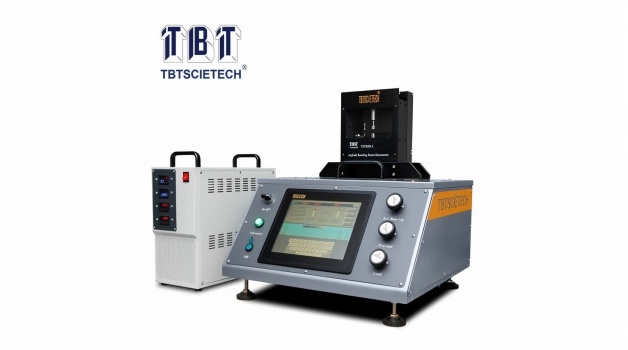- Home
- About TBT
- Products
- Material
- Cement
- Concrete
- Asphalt-bitumen
- Soil
- In-Situ Testing
- Tri-axial Test Apparatus
- Consolidation Testing Machine/Consolidometer
- Shear Testing Apparatus/Machine
- Compaction Test Machine/Compactor
- Permeation/Swell Testing Apparatus/Permeameter
- Density Testing Machine/Apparatus
- Soil Moisture Meter
- Atterberg limits / liquid plastic limit
- Other Equipment/Machine
- Geotextile & Geosynthetics
- Pavement
- Rock
- Aggregate
- Geological
- NDT
- Petroleum
- Ceramic
- General Lab
- PH Meter
- Conductivity Meter
- Biochemical Analyzer
- Centrifuge
- Furnace/Drying Oven
- Electric Balance
- Thermometer/Hygrometer
- Microscope
- Whiteness Tester/Color Meter
- Ball Mill
- Vacuum Pump
- Magnetic Stirrer
- Refractometer
- Indicator Paper
- Supersonic Cleaner
- Water Bath
- Spectrophotometer(UV/VIS/AAS)
- Viscometer
- Cuvette
- Environment Meter
- Other Equipments
- Color Meter / Gloss Meter
- Rubber-Plastic
- Surveying
- Paint
- News & Events
- Download
- Contact us
Measuring Asphalt Properties: The Significance of Bending Beam Rheometers
Asphalt is a crucial material in the construction industry, serving as the primary component in road surfaces. In this article, we provide an overview of Bending Beam Rheometers, a widely used testing instrument in the asphalt industry. We also discuss the key role that Bending Beam Rheometers play in evaluating asphalt properties and ensuring the longevity of road infrastructure.Our Bending Beam Rheometer model is TBTBBR-1.
Bending Beam Rheometers: An Overview
Bending Beam Rheometers, also known as BBRs, are an essential tool in the field of asphalt testing. These devices are used to evaluate the low-temperature properties of asphalt binders, which is crucial for determining its performance in cold climates. In this article, we will provide an overview of Bending Beam Rheometers and their significance in the asphalt industry.
BBRs work on the principle of measuring the flexural stiffness of an asphalt binder specimen at low temperatures. The test involves subjecting a beam-shaped specimen to a bending load and measuring the resulting deflection. By analyzing the deflection behavior, engineers can determine important parameters such as the stiffness modulus and the critical cracking temperature of the asphalt binder.
The Asphalt Bending Beam Rheometers test is standardized by organizations such as the American Association of State Highway and Transportation Officials(AASHTO) and the American Society for Testing and Materials (ASTM). These standards ensure consistent test procedures and accurate results across different laboratories. The test involves carefully preparing the asphalt binder specimen, applying the bending load, and recording the deflection measurements.The data obtained from the Bending Beam Rheometer test can then be used to validate and improve existing asphalt binder specifications.
The importance of Bending Beam Rheometers in the asphalt industry cannot be overstated. These specialized testing devices play a critical role in ensuring the quality and performance of asphalt materials used in construction projects.
Asphalt Bending Beam Rheometers are designed to measure the stiffness and flexural properties of asphalt binders and mixes. By subjecting the samples to controlled bending forces, these instruments provide valuable insights into the material's ability to resist cracking and deformation under different temperature and loading conditions.
One of the key advantages of Bending Beam Rheometers is their ability to simulate real-world conditions. The asphalt industry operates in a wide range of climates, from extreme cold to scorching heat. Understanding how asphalt materials behave under varying temperatures is crucial for designing durable and long-lasting roads, highways, and other infrastructure.
Additionally, Bending Beam Rheometers help in assessing the effectiveness of different additives and modifiers used in asphalt mixtures. These additives can enhance the performance and longevity of pavements by improving rut resistance, fatigue life, and moisture susceptibility. By evaluating the rheological properties of modified asphalt, engineers can make informed decisions about the optimal blend of materials for specific applications.
The data obtained from Bending Beam Rheometers also aids in the development of performance-based specifications for asphalt materials.Traditionally, specifications relied on empirical tests such as viscosity and penetration. However, these tests have limited correlation with field performance.Bending Beam Rheometers provide more accurate and reliable data, enabling engineers to set performance criteria based on actual material behavior.



 Contact person: Ms. Toni Gu
Contact person: Ms. Toni Gu  toni_gu@tbt-scietech.com sales@tbt-scietech.com
toni_gu@tbt-scietech.com sales@tbt-scietech.com 0086-25-8472 1577 / 8472 1579 / 8472 1907
0086-25-8472 1577 / 8472 1579 / 8472 1907 Mobile / WhatsApp: 0086-138 5170 2127
Mobile / WhatsApp: 0086-138 5170 2127 0086-25-8472 2235
0086-25-8472 2235 Rm. 2903-2904 HuaXia Mansion, No. 81 ZhongShan Rd.,
Rm. 2903-2904 HuaXia Mansion, No. 81 ZhongShan Rd.,

